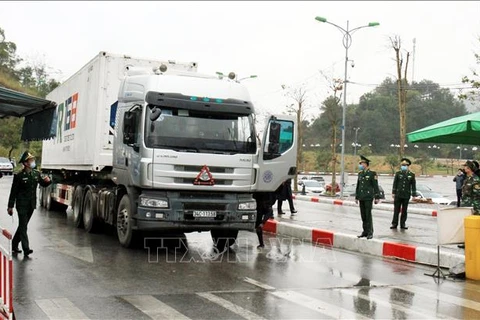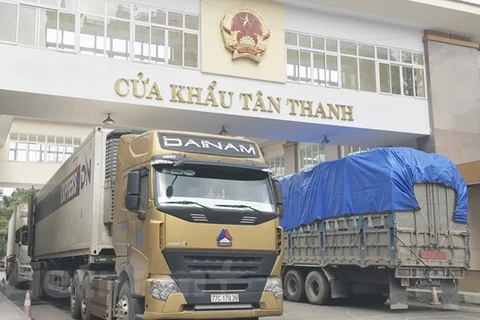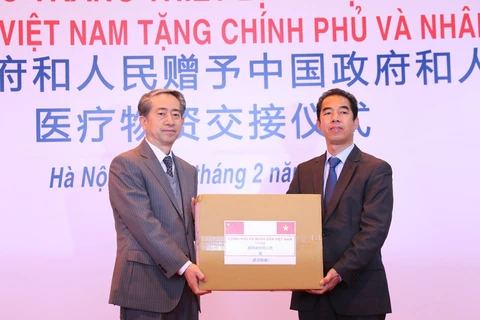 Trucks carrying goods pass the Tan Thanh border gate in Lang Son province, which borders China (Photo: VNA)
Trucks carrying goods pass the Tan Thanh border gate in Lang Son province, which borders China (Photo: VNA) Hanoi (VNA) – The outbreak of the 2019 novel coronavirus (2019-nCoV) has affected Vietnam’s trade with not only China but also other markets, said Deputy Minister of Industry and Trade Do Thang Hai.
In January, Vietnam posted 19 billion USD in exports, down 15.8 percent from December 2019 and 14.3 percent year on year. The US was the biggest importer of Vietnamese goods in the month, followed by China, the EU, ASEAN, Japan and the Republic of Korea.
Meanwhile, imports also dropped 14.4 percent from the previous month to 19.1 billion USD, according to the Export-Import Department under the Ministry of Industry and Trade (MoIT).
The declines were partly attributed to complex developments of the 2019-nCoV outbreak, as well as the week-long Lunar New Year holiday.
Pointing out the epidemic’s impacts on Vietnam’s trade with not only China but also other countries, Hai used textiles and garments as an example, elaborating that Vietnam is an apparel exporter, but it also imports a large amount of textile and garment materials from China. Therefore, the outbreak has influenced all aspects, from imports and exports and cross-border trade, to domestic trade and industrial production.
Vietnam and China share a long border with many border gates via which a large volume of imports and exports are traded.
The MoIT is keeping a close watch on the nCoV epidemic to assess its impacts on trade. However, despite strict measures being taken to contain the epidemic, the transport of goods to and from Chinese localities is proving difficult.
If the epidemic lingers, the trade volume via border gates between the two countries will be affected, experts noted.
Hai said Vietnam’s agricultural and aquatic exports still depend much on China, so any fluctuations in this market, regardless of objective or subjective reasons, will greatly influence Vietnam’s export activities.
Agricultural restructuring towards less quantity and higher quality has yet to be carried out effectively. Besides, it is difficult to find other markets quickly to replace China since the domestic agriculture sector is unable to immediately satisfy new markets’ food safety and animal and plant quarantine standards, he added.
The MoIT has asked businesses to closely follow the export situation in northern border provinces like Lang Son, Lao Cai, Quang Ninh and Cao Bang to adjust their production and export plans to avoid congestion at border gates and other negative impacts.
Vietnamese firms have also been told to strictly comply with export and origin-related regulations, improve product quality, and adhere to relevant requirements to minimise losses.
However, the ministry said in the long term, it is necessary to restructure agricultural products, boost production and processing connectivity, and strengthen links with domestic distribution networks to avoid overdependence on a single market.
To tackle difficulties at border gates, Prime Minister Nguyen Xuan Phuc on February 5 permitted the continuation of cross-border imports and exports but said anti-nCoV measures must be ensured./.
VNA
























